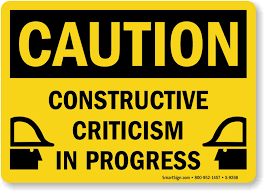 I love being criticized! Don’t you?
I love being criticized! Don’t you?
Let’s be totally honest-
Most of us don’t like to be criticized.(even when it is constructive)
- It’s uncomfortable.
- It feels like we’ve been bad and we just got caught
- It’s like getting our hand slapped
- It feels like we’re being told we’re not good enough
- Like someone is demeaning us.
- It makes us Grouchy
- It raises our pulse; it makes our mind race.
- It hurts.
- We feel like we just got hit and we want to hit back!
Even though all these emotional reactions are understandable, they can be counterproductive.
Criticism is unavoidable!
The only way to live a life without criticism is to hide away in a cave and never see anyone.
If you are around other people, you’re going to receive some criticism.
How good are you at handling criticism?
Here’s the three most common ways people handle criticism.
- Withdraw/Stop communicating (FLIGHT)
- It makes you so mad that you just quit talking to the person. You just get up and walk completely away from them. (you take flight)
- Counterattack, FIGHT
- Why you………. How dare you…………. You think you’re perfect………..Well, what about all the things that are wrong with you?
- If you’re going to attack me, I’m going to attack you back.
- Rationalize away the criticism
- You try to convince the person they’re wrong-it’s not true-what they are saying isn’t right.
- When you rationalize it away, you miss the opportunity to learn and grow.
Since we’re all going to experience criticism, couldn’t we all benefit from learning a more productive way to handle it?
EXAMPLE
I didn’t have to think very long to come up with an example in my own life.
My husband was providing me with some “constructive feedback” on getting things done RIGHT AWAY. I tend to procrastinate and think, “I’ll do that later.”
Things like sending an RSVP for weddings, returning phone calls, (I really need to work on that one!) basically doing things right now versus waiting till the last minute.
I got my taxes done on April 15 if that tells you anything.
At first –I tried to defend myself by explaining all the times I do get things done. (rationalizing it as nothing) Then I’d sarcastically say-“Well, we can’t all be perfect like you.” (counter attack)
There were also times when I’d just get mad and quit talking to him.(FLIGHT)
I’d see it as an attack. I definitely took it personal. I wasn’t very good at using it as an opportunity to grow.
Can you relate?
Could I have handled my husband’s criticism better? Yes, and I’m working on that!
Here’s a five step plan that you can add to your toolbox so you can successfully use constructive criticism to your advantage instead of letting it blindside you into an unproductive emotional reaction.
STEP ONE:CHANGE YOUR PERSPECTIVE
Most people attach a negative connotation to the word “criticism” because it brings to mind something destructive. We all remember being taunted or criticized for no apparent reason as children, and those memories often linger into adulthood.
We need to reframe constructive criticism as something positive-
Positive Reframes for Constructive Criticism:
- Think of the person as being a “Good guy” that’s trying to help you versus making him out to be the “bad guy.” Assume he’s trying to be helpful vs hurtful.
- Criticism can be a learning and growing experience.
- Think of it as a gift. (even if it feels like it’s wrapped in sand paper)
- Look at it as a chance for personal growth vs letting it trigger shame and resistance.
- Instead of saying to yourself-“How dare they!” turn it around to “Thanks for trying to help me out”
STEP TWO: DON’T TAKE IT AS A PERSONAL ATTACK
People often take criticism as a personal attack, or as a signal that all the things they’ve done right aren’t being appreciated, and then they get defensive, reactive and upset. (Yep, I did that)
- Try to stay calm and centered. Remind yourself that going into defensive mode and getting emotionally upset won’t help the situation.
- Take a few seconds to recognize and acknowledge the emotion the criticism is evoking in you.
- What is the feeling? Name it to tame it.
- Where do you feel it in your body? Is your head racing? Is your chest pounding? Is your face heating up?
- Giving your full attention to the feeling can actually help to calm you down. (We usually have a tendency to run from the feeling but we need to move towards it instead) (What you resist persists)
Next, take time to breathe. BREATHE IN CALM and PEACE- and BREATHE OUT ANGER.
Breathing will calm your whole body down.
When you take time to feel your emotions and breathe, you will be able to think more rationally and not take things as personal.
STEP THREE: LISTEN AND BE OPEN MINDED
When you start to feel yourself getting worked up-remind yourself to:
“Be genuinely open to hearing what the other person is saying and try not to interrupt or jump to conclusions,”
Repeat to yourself:
- “I am going to listen to what they have to say and just breathe through my emotional reactions.”
- “It’s ok. This doesn’t take away from my worth as a person. I can listen to their opinion and maybe even learn something from it.”
Ask yourself:
- “What helpful knowledge can I gain if I am open minded and listen?”
STEP FOUR: REPEAT, PARAPHRASE & ASK QUESTIONS
Ask questions to make sure you understand correctly.
It’s easy to MISINTERPRET what someone is saying.
Sometimes when it goes through our personal filtering system, it gets distorted from what the true message was-so make sure you repeat it, question it and truly understand what they are really saying.
Ask:
- “Is this what you are saying?”
- “Is this what you mean?”
It’s amazing how many times I’ve used this one step and found out that I was taking it totally wrong. I’m so glad I checked it out or I would have caused myself unnecessary frustration.
And the final, but one of the most important steps:
STEP FIVE: FIND WHATEVER TRUTH YOU CAN & ASK FOR HELP
Most people focus on the part that’s not true versus seeing parts that are true.
MY EXAMPLE–Yes, it’s true-I forget to buy the card, the gift, return the phone call, send the RSVP, do the things I am suppose to do.
It’s true, that’s something I need to work on.
I can even ask for helpful suggestions, “Do you have any suggestions to help me with that?”
So, I did actually ask him and I’m using one of his suggestions which is to set reminders on my iPhone. I can tell Siri to remind me in two hours to call so and so back. Or to buy a card or to do whatever it is that I may likely forget to do.
__________________________________________________________________________
We’re all imperfect human beings and it doesn’t take away from our worth as a person because we mess up and we admit it. Sometimes we could all benefit from being a little bit more vulnerable about our shortcomings instead of getting so defensive.
Constructive Feedback doesn’t have to be a “BAD GUY” and we can be thankful for it, and use it to help us DEVELOP into a better person.
__________________________________________________________________________
So, to sum up the FIVE WAYS to successfully use criticism to your advantage.
-
Change your perspective
-
Don’t take it as a personal attack
-
Listen and be open minded
-
Repeat, paraphrase and ask questions
-
Find whatever truth you can in it & ask for helpful suggestions
Each time you practice using these skills, you’ll increase your ability to learn and grow from criticism versus getting emotionally reactive and defensive.
Eventually you’ll be a pro at staying calm and collective during criticism.
Successful people—hear it, glean what they can from it and move on without getting emotionally stuck on it.
Practice, Practice, Practice………….
___________________________________________________________________________
Fay Prairie is a personal life coach and speaker specializing in personal development, relationships and empowering mindsets. She helps set you free from stress, negativity AND FRUSTRATION so you can start creating a life and relationships that you’re excited to wake up to!
Better You…Better Relationships…Better Life…
Fay also provides workshops and trainings. Check out her speaking page by Clicking Here
Contact Fay to set up a FREE 30 minute call to discover how Personalized Life Coaching can help you to begin making positive changes in your life! (e-mail fay@fayprairie.com or call 507-829-0181)







